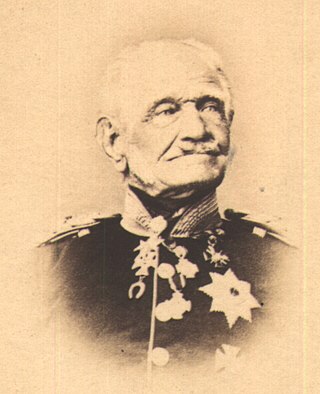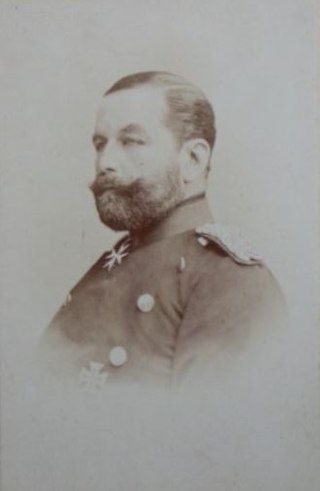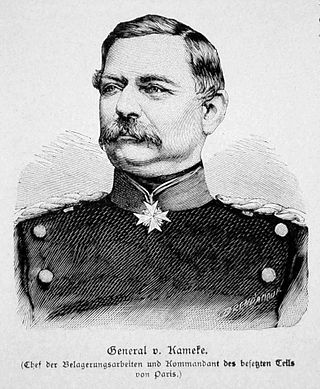
Albrecht Theodor Emil Graf von Roon was a Prussian soldier and statesman. As Minister of War from 1859 to 1873, Roon, along with Otto von Bismarck and Helmuth von Moltke, was a dominating figure in Prussia's government during the key decade of the 1860s, when a series of successful wars against Denmark, Austria, and France led to German unification under Prussia's leadership. A moderate conservative and supporter of executive monarchy, he was an avid modernizer who worked to improve the efficiency of the army.

Helmuth Karl Bernhard Graf von Moltke was a Prussian field marshal. The chief of staff of the Prussian Army for thirty years, he is regarded as the creator of a new, more modern method of directing armies in the field and one of the finest military minds of his generation. He commanded troops in Europe and the Middle East, in the Second Schleswig War, Austro-Prussian War, and Franco-Prussian War. He is described as embodying "Prussian military organization and tactical genius". He was fascinated with railways and pioneered their military use. He is often referred to as Moltke the Elder to distinguish him from his nephew Helmuth von Moltke the Younger, who commanded the German army at the outbreak of the First World War. He is notably the earliest-born human whose recorded voice is preserved, being born in the last year of the 18th century (1800). He made four recordings; two that were recorded in October 1889 are preserved to this day.

Helmuth Johannes Ludwig Graf von Moltke, also known as Moltke the Younger, was a German general and Chief of the Great German General Staff, a member of the House of Moltke. He was also the nephew of GeneralfeldmarschallGraf Helmuth Karl Bernhard von Moltke, who is commonly called "Moltke the Elder" to differentiate the two.

Prince Friedrich Karl Nikolaus of Prussia was the son of Prince Charles of Prussia (1801–1883) and his wife, Princess Marie of Saxe-Weimar-Eisenach (1808–1877). Prince Friedrich Karl was a grandson of King Frederick William III of Prussia and a nephew of Frederick William IV and William I.

Adrian Friedrich Wilhelm Julius Ludwig von Verdy du Vernois, often given the short name of Verdy, was a German general and staff officer, chiefly noted both for his military writings and his service on Helmuth von Moltke the Elder's staff during the Franco-Prussian War.

Friedrich Heinrich Ernst Graf von Wrangel was a Generalfeldmarschall of the Prussian Army.

Karl Konstantin Albrecht Leonhard Graf von Blumenthal was an officer of the Prussian Army and field marshal of the Imperial German Army, chiefly remembered for his decisive intervention at the Battle of Königgrätz in 1866, his victories at Wörth and Weißenburg, and above all his refusal to bombard Paris in 1870 during the siege, of which he was in command.

Alfred Ludwig Heinrich Karl Graf von Waldersee was a German field marshal (Generalfeldmarschall) who became Chief of the Imperial German General Staff.

August Karl Friedrich Christian von Goeben, was a Prussian infantry general, who won the Iron Cross for his service in the Franco-Prussian War of 1870–71.

Karl Wilhelm Friedrich August Leopold Graf von Werder was a Prussian general.

Alexander August Wilhelm von Pape was a Royal Prussian infantry Colonel-General with the special rank of Generalfeldmarschall.

Eduard Ernst Friedrich Hannibal Vogel von Fal(c)kenstein was a Prussian General der Infanterie.

Ernst Karl Ferdinand von Prittwitz und Gaffron was a Royal Prussian Lieutenant General and Knight of Justice of the Order of Saint John.

Arnold Karl Georg von Kameke was a Prussian General of the Infantry and Minister of War.

Hugo Ewald Graf von Kirchbach was a Prussian general who commanded the Prussian V Corps during the Franco-Prussian War.

Eduard Friedrich Karl von Fransecky was Prussian general who served in the Austro-Prussian War and the Franco-Prussian War.

Günther Emanuel Graf von Kirchbach was a German Generaloberst who served during the First World War.

Konstantin Bernhard von Voigts-Rhetz was a Prussian general who served in the Austro-Prussian War and the Franco-Prussian War.

Max von Bock und Polach was a Prussian officer and Field Marshal. He served in the military during the three wars of German unification under the leadership of Prime Minister Otto von Bismarck.

Hugo Moritz Anton Heinrich Freiherr von Obernitz was a Prussian general who served as adjutant general of Kaiser Wilhelm I.




















